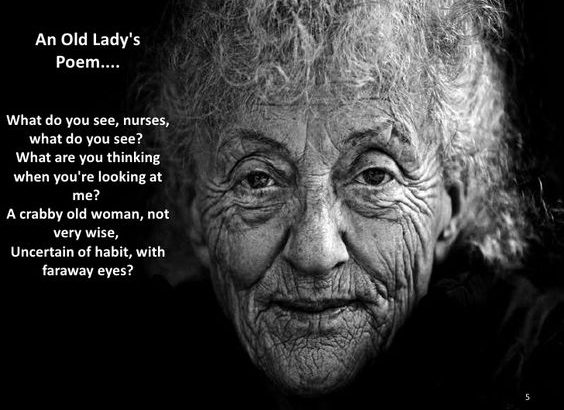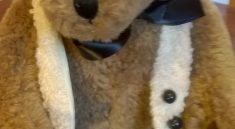An Old Lady’s Poem who died in a hospital near Dundee, Scotland, Why do we treat elderly people so badly?, Pope John Paul II: “A society will be judged on the basis of how it treats its weakest members and among the most vulnerable are surely the unborn and the dying,”
“A society will be judged on the basis of how it treats its weakest members and among the most vulnerable are surely the unborn and the dying,” Pope John Paul II
An old lady’s poem.
“What do you see, nurses, what do you see?
What are you thinking when you’re looking at me?
A crabby old woman, not very wise,
Uncertain of habit, with faraway eyes?
Who dribbles her food and makes no reply
When you say in a loud voice, “I do wish you’d try!”
Who seems not to notice the things that you do,
And forever is losing a stocking or shoe…..
Who, resisting or not, lets you do as you will,
With bathing and feeding, the long day to fill….
Is that what you’re thinking? Is that what you see?
Then open your eyes, nurse; you’re not looking at me.
I’ll tell you who I am as I sit here so still,
As I do at your bidding, as I eat at your will.
I’m a small child of ten …with a father and mother,
Brothers and sisters, who love one another.
A young girl of sixteen, with wings on her feet,
Dreaming that soon now a lover she’ll meet.
A bride soon at twenty — my heart gives a leap,
Remembering the vows that I promised to keep.
At twenty-five now, I have young of my own,
Who need me to guide and a secure happy home.
A woman of thirty, my young now grown fast,
Bound to each other with ties that should last.
At forty, my young sons have grown and are gone,
But my man’s beside me to see I don’t mourn.
At fifty once more, babies play round my knee,
Again we know children, my loved one and me.
Dark days are upon me, my husband is dead;
I look at the future, I shudder with dread.
For my young are all rearing young of their own,
And I think of the years and the love that I’ve known.
I’m now an old woman …and nature is cruel;
‘Tis jest to make old age look like a fool.
The body, it crumbles, grace and vigor depart,
There is now a stone where I once had a heart.
But inside this old carcass a young girl still dwells,
And now and again my battered heart swells.
I remember the joys, I remember the pain,
And I’m loving and living life over again.
I think of the years ….all too few, gone too fast,
And accept the stark fact that nothing can last.
So open your eyes, nurses, open and see,
…Not a crabby old woman; look closer …see ME!!”
From Justice Magazine.
“When an old lady died in a geriatric ward in Scotland the nurses were surprised to find amongst her belongings a poem she had written.”



